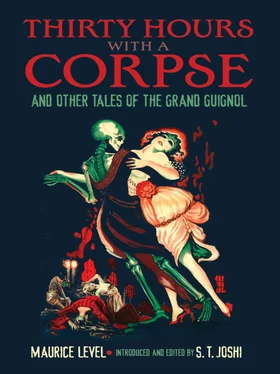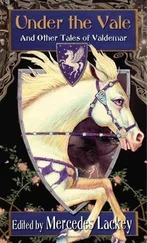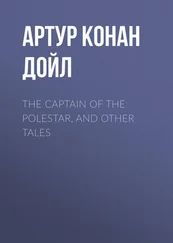The man’s anger blazed up again; he bent down and was drawing the boy toward him when suddenly an oath strangled in his throat.
There, near the cheek, almost at the corner of the mouth, was a light brown mole, smaller, but a mole exactly like the bigger one Big Jacquet called his “Beauty-Spot.”
The last vestige of doubt vanished. No, this was not his child; he was the child of the other man… Everything round him seemed to fade away, and the blaze on the hearth seemed to enter his chest and burn his flesh. He seized the boy by the collar.
“Get out… Never let me see you again… Out with you!”
The child resisted, but he dragged him with one hand to the door, pulled it open and flung him out as one would some unclean beast, and banged it to again.
A ferocious growl… a cry of agony rang through the darkness. The man stood stupefied, unable to think. But the mother, who had been listening in the next room, came hurrying out. Not seeing the child and noting the wildness in her husband’s eyes, she shouted:
“What have you done?”
Another cry rang out:
“Mother… Moth…”
She rushed outside calling:
“My little one! My little one!”
The child lay panting at the bottom of the steps, his face all torn by the dog’s fangs. The beast tried to keep its grip on its prey, but she paid no attention to it, and seizing the boy in her arms dragged him away.
She laid him on the table. His throat was open, his breath came in short gasps. She showered passionate kisses on his poor mud-filled hair, on his poor little blood-covered face, on his open mouth from which the death-rattle was coming…
…Crouched in a heap on the floor, his eyes shut, his fingers in his ears, the man was sobbing:
“My little one, Holy Virgin, save my little one!”
NO ONE ever understood how this woman, who was neither young nor pretty, got complete possession of the heart, the mind, the whole life of Miron. As soon as he met her he broke with his best friends, left off going to his familiar haunts, and instead of devoting himself as formerly to Art for Art’s sake, took to painting the rankest potboilers. When a man who had been a great friend in the old days ventured to say:
“You’re an idiot, Miron. You are spoiling your style, abusing your talent…” he only shrugged his shoulders and said: “Nonsense.” When the friend insisted, reminding him of the conscientious work, full of more than promise, he had done in the old days of his dreams of fame, he grew angry.
“My talent? My dreams? You make me laugh. When I had them I slept in a garret, I had one meal a day. I know people will now stop saying: ‘You’ll see, he’ll be rich some day!’ but in the meanwhile I can eat as much as I like and am free from sordid worries. I am happy, very happy.”
He walked rapidly away. But when he was sure that he was out of sight, he stopped at a café and sat for hours lost in thought with an empty glass in front of him. Miron lied: he was not happy. At first his love had absorbed him to the exclusion of everything else. To get the extra money that was necessary for his new kind of existence he had dashed off little sketches and drawings for the illustrated papers, and when he felt too disgusted with this prostitution of his talent, he had consoled himself by thinking that before long he would return to serious work. But as time flew by he had become morally weak, almost cowardly, and now there was a gnawing bitterness at the bottom of his heart and he was ashamed of himself, ashamed of the soulless love in which he had slowly but surely lost his better self. Debts accumulated, and at last there came a day when, worn out by the threats of those to whom he owed money and by scenes with his mistress, he lost his head and wrote a check he could not meet. He hoped to be able to get the money before the check was presented, but he was not able to do so, and, taking fright, he fled from Paris, from France.
To avoid rousing suspicion he went alone; his mistress was to follow next day. He was so certain she would come he went to bed and fell asleep happily, almost without remorse. He expected a letter from her in the morning telling the time of her arrival; next night there came instead a telegram with just four words: “I am not coming.”
At first he was too stunned to take it in; it did not seem possible she could have written that. But on reflection he told himself without bitterness that after all she was right; he was a thief. Thoughts of the lost love merged themselves in the remembrance of the days when his face was set toward fame, and a great weariness, mental and physical, made him feel like a child that has lost itself. You need courage to make an effort to save yourself. He had none left. He resolved to go back to Paris, to be arrested, to be punished. Nothing could be worse than what he had already suffered because of his voluntary artistic downfall. Indeed, it would only seem natural, right, that he should be publicly disgraced. He hesitated a little at the thought of the court, prison, the dishonor from which it was still possible to save himself. But why should he mind? A man might make an effort if he had to consider a wife, parents, friends, anyone he respected; or even if he were well known, his name stood for something good… But he?
He took up the newspaper, looked at it without interest, and became very pale. There was a big headline: DISAPPEARANCE OF THE ARTIST MIRON. It was a long article, and a new thought came to him as he read and re-read it. Every day a dishonest cashier disappears; every day a forger is arrested—did people take any real interest in them? This article made it clear that his flight had aroused unusual interest, that his loss caused regret; if so much space were devoted to him, it showed that the public had begun to recognize his talent and valued it. He was not unknown. He was “Somebody”; he had a name.
His infamy was the revelation of his glory. The idea of prison that had before weighed so lightly now horrified him. He was tortured by shame, fear, and pride. For days he shut himself up in his room, watching suspiciously anyone who stopped under his window, reading with passionate interest all that the papers continued to say about his disappearance and, above all, about his work. Before long he was relegated to the second page of the newspapers, then to the third; two succeeding days there was no mention of him; twice or thrice his name cropped up at intervals; then—silence. People ceased talking of him, the authorities left off looking for him. He felt sure he had escaped, that he could come and go as he liked. He was free.
It was only then that he realized how completely alone in the world he was.
Then came want; he was penniless. He must do something to earn a living. But what could he do? Drawing? Painting? And give them a chance to recognize his style and so lead to his arrest? How could he run the risk of reviving memories of himself only to blacken afresh a name he had now become proud of ! Never had he been so aware of his real talent as now when he dare not show a new picture. But he must do something to get the money to support life. He thought of giving lessons, but no one cared to have them; he tried to obtain work in an office, but he had not the necessary certificates. He did all sorts of odd jobs, even the humblest, those that demand nothing but physical strength. His clothes wore out, became covered with stains; he lost his looks, his hair and beard grew gray. Over and over again he determined to kill himself, but resolution failed him at the last moment. His mind would travel back to the old days, to the little studio where he had dreamed such great dreams, and a vague feeling of hope would change the current of his thoughts.
Читать дальше












